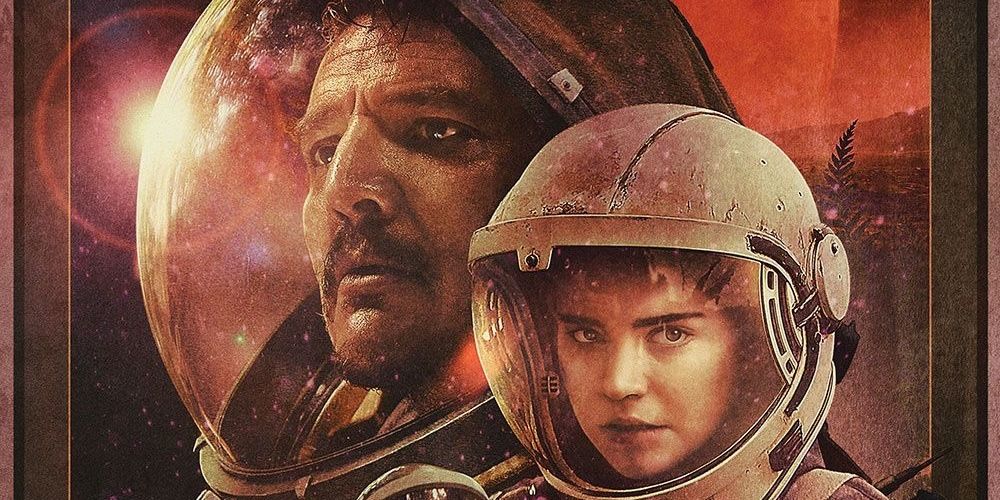Prospect deserves credit for its ambitious vision and scope, but Earl and Caldwell's effort is undone by mediocre script and character work.
Debuting earlier this year at the South by Southwest Film Festival, the sci-fi film Prospect is now arriving in theaters. Directors Zeek Earl and Chris Caldwell extend their 2014 short of the same name here, making their feature-length debut in the process. Obviously, Prospect was going to be somewhat constrained by its smaller budget, but there was still the potential for the narrative to help elevate the project and make it a special indie offering. Sadly, that isn't quite the case. Prospect deserves credit for its ambitious vision and scope, but Earl and Caldwell's effort is undone by mediocre script and character work.
The film picks up as Damon (Jay Duplass) and his teenage daughter Cee (Sophie Thatcher) embark on a potentially dangerous mission to collect lucrative gems from a moon's surface so they can improve their livelihoods. Cee is concerned the two will not have enough time to complete the task before the last ride home leaves town, but a determined Damon insists they must go through with it. He has his eyes set on a massive score by digging through what's known as the Queen's Lair and bringing back the untold riches.
On their journey across the moon, Damon and Cee encounter another prospector, Ezra (Pedro Pascal), who is also on the hunt for some gems. Events unfold in a way that force Cee and Ezra to work together, where they must put aside their differences and not only find a decent score, but also a way home.
Prospect's greatest strengths are its production values and aesthetic. The locations chosen for the moon are fittingly ethereal and mystical, calling to mind the Shimmer from Alex Garland's Annihilation. There's a dream-like quality to the visuals, and it's easy for audiences to buy into this being a place far from home. Earl and Campbell also make the most of the resources they have to work with, stretching the budget for sets, props, and costume design to their limits. Their film's sci-fi universe has a tangible, lived-in feel, aided in large part by the minimal use of CGI. Despite the obvious limitations, Prospect never feels cheap, allowing viewers to become immersed in its world.
Where things start to fall apart is with the screenplay, which was written by Earl and Caldwell. While there are examples of shorts being expanded into successful features (District 9 comes to mind), this is an instance where the concept was too thin to support a 90-minute movie. The filmmakers cannot establish a true emotional connection with the viewer, making it increasingly difficult to become invested in what's happening onscreen. Characters are given very minimal development and shading, and as a result, Prospect can feel like a chore to watch at times. Most egregious is the creative team's failure to flesh out the dynamic between Damon and Cee, which is meant to be a key component of the film's emotional core (particularly early on). There are also sections that feel like filler, dragging the film down even as it clocks in a relatively brisk running time. Cold and distant sci-fi can be effective, but this is a case where things needed a tighter and humanistic touch.
It doesn't help matters that the roles are thinly written. Duplass is handed a thankless part and does what he can to maximize his brief screen time. Sadly, he doesn't leave much of an impact as Damon and comes across as wasted. Thatcher fares a little better as a tough-as-nails kid who's wise beyond her years, though Cee isn't a memorable character, either. Their interactions are fairly pedestrian, with the screenplay putting little effort into them. It's difficult to envision the two as a real family and there are certain threads (see: a conversation about Cee's home) that aren't fully developed by the time the credits roll. The Damon/Cee dynamic is a blown opportunity that would have gone a long way in improving Prospect's overall quality.
Pascal attempts to liven things up with his presence, and Ezra is arguably the movie's best character. Script faults prevent Ezra from having a real arc and endearing himself to the audience, but he's still a fascinating figure to watch because of Pascal's demeanor and turn. There's an unpredictable nature to Ezra, and the actor is convincing enough as an experienced mercenary-type. As the story moves along, Earl and Caldwell try to dedicate time to forming a rapport between Ezra and Cee, but it doesn't wholly work. The two do have moments, and it seems like they're earning a mutual respect for each other, but the end result doesn't land with the intended effect. While that could be accredited to Thatcher being almost too stoic, there isn't much to the plot, so it's more likely an issue with the material instead of disappointing performances.
In the end, Prospect demonstrates Earl and Caldwell definitely have an eye for strong visuals and their technical prowess should only increase as their careers progress. Where they need to improve is in the screenwriting; they show a penchant for world-building in their dialogue, but there isn't enough work put into the characters. Of course, audiences can live vicariously through Ezra and Cee and imagine themselves in the same situation, though that's merely surface-level and can only go so far before the film overstays its welcome. Prospect is swinging for the fences, but it's hard to recommend to anyone who's not a die-hard genre enthusiast.
Trailer
Prospect is now playing in select U.S. theaters. It runs 100 minutes and is rated R for some violence/bloody images.
Let us know what you thought of the film in the comments section!




